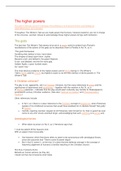The higher powers
The godsA Christian universe?Astrological forcesReliance on divine powersLoss and findingLost
relativeRepentance and restoration
Throughout The Winter's Tale we are made aware that humans, however powerful, are not in charge
of the universe. Leontes' refusal to acknowledge these higher powers brings swift retribution.
The gods
The fact that The Winter's Tale seems to be set in a pagan world is evident from Florizel's
recollections of the actions of the gods as he describes them to Perdita in Act IV, sc iv:
‘The gods themselves
Humbling their deities to love, have taken
The shapes of beast upon them: Jupiter
Became a bull, and bellow'd; the green Neptune
A ram, and bleated; and the fire-rob'd god,
Golden Apollo, a poor humble swain,
As I seem now.'
The most obvious evidence of the higher powers and of divine beings in The Winter's
Tale is Apollo and his Oracle, but Apollo's oracle is not the first mention of divine powers in The
Winter's Tale.
A Christian universe?
The play is not, apparently, set in a Christian Universe, but the many references to grace and the
significance of repentance and forgiveness – together with the mention in Act IV, sc iv
of Whitsun pastorals – indicates that the play would seem culturally very familiar to Shakespeare's
seventeenth century Christian audience. (See also: Spiritual re-creation; and Characterisation:
Paulina.)
Other references include:
• In Act I, sc ii there is a clear reference to the Christian concept of original sin, when Polixenes
speaks of his childhood innocence that would have enabled him to declare himself ‘Not guilty'
to heaven.
• Camillo, rejecting Leontes' request to kill Polixenes, tells himself (in Iii.) that no good has ever
come to any who ‘struck anointed kings', acknowledging that such anointing is a sacred act)
Astrological forces
• When taken to prison (in Act II, sc i) Hermione says that:
‘I must be patient till the heavens look
With an aspect more favourable.'
• ‘the heavens' which Hermione refers to seem to be synonymous with astrological forces,
since she assumes that ‘There's some ill planet reigns'
• But in Act III, scene ii., at her trial, it is clear that she believes strongly in the concept of
heavenly judgement of humans (a familiar teaching in the Christian church):
‘But thus; if powers divine
Behold our human actions (as they do),
I doubt not then but innocence shall make
, False accusation blush, and tyranny
Tremble at patience.'
Reliance on divine powers
• Hermione declares: ‘I do refer me to the Oracle: Apollo be my judge!'
• It is an act of extreme dramatic irony that Leontes, who has most offended the gods, should
himself (in Act II, sc i) be the first to ask for the ruling of Apollo's oracle, claiming that this
proves his own good judgement:
‘Yet, for a greater confirmation
(For in an act of this importance, ‘twere
Most piteous to be wild), I have dispatch'd in post
To sacred Delphos, to Apollo's temple, Cleomenes and Dion…
… now from the Oracle
They will bring all; whose spiritual counsel had,
Shall stop or spur me.'
Loss and finding
In Act III, sc ii the Oracle proclaims the innocence of Hermione and the guilt of Leontes. It also
proclaims the need to rediscover the lost child, and in this way the power of the gods dominates the
second half of the play. This culminates with the comment of the Gentleman in Act V, sc ii that:
‘the Oracle is fulfilled; the king's daughter is found.'
Lost relative
• The loss of his child symbolises Leontes' loss of rationality, good judgement and innocence
• Perdita's very name (suggested by Hermione's vision to Antigonus in Act III, sc iii and then
used by the shepherds although they never spoke to Antigonus: Shakespeare probably
guessed that the audience would never notice!) means ‘the lost one'
• Her return can only come once Leontes has fully repented and has rediscovered grace
• Mamillius is lost to his parents for ever.
The idea of a lost child or children, often with such symbolical significance, runs through not only
Shakespeare's Romance Plays, but also others such as Macbeth.
• Paulina also reminds Leontes, ‘my own lord … is lost too'.
Not all these losses can be made good.
Repentance and restoration
However, the play's message is that repentance can lead to restoration. The many references to
shepherds might well have reminded Shakespeare's audience of a particular Bible story (which they
would know from the church services which were compulsory to attend): the parable of the lost
sheep, from Luke 15:4-7.
Spiritual re-creation





